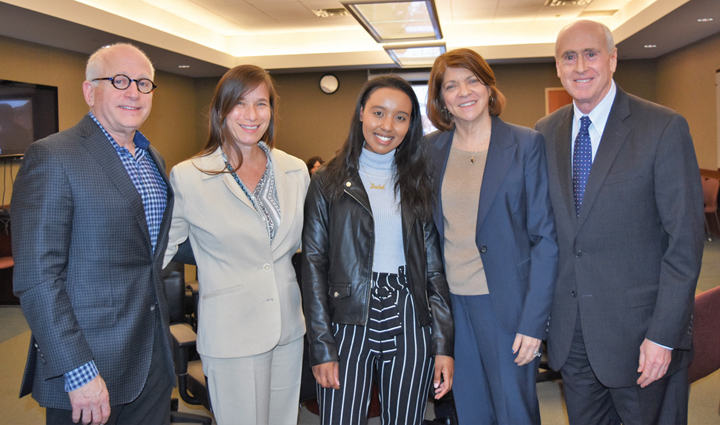
During her recent visit to the Jewish Federation of Greater Kansas City’s office, 20-year-old Rachel Alemu eagerly dug through a bowl of mini candy bars. They have Twix in her home country of Israel, she said, but she’d never had a Hershey’s bar before. She bit into the chocolate, chewed and then gave a little smile.
Alemu came to Kansas City from Ramle, Kansas City’s sister city in Israel, to talk about her experience with the Ethiopian National Project (ENP), one of Jewish Federation’s overseas partner agencies. ENP’s mission is to ensure the full and successful integration of Ethiopian Jews into Israeli society.
According to Grace Rodnitzki, ENP’s director of international relations, there are currently more than 141,000 Ethiopian-Israelis. The community faces huge cultural, economic and educational gaps, making it a challenge for them to assimilate to life in Israel. Thirty-five percent of Ethiopian-Israeli families live under the poverty line and there are twice as many single-parent families.
Alemu’s family falls into both categories. Her parents made aliyah from Ethiopia in 1991 after a long journey that took them by foot with three young children from their small Ethiopian village to Sudan, then back to Addis Ababa where they were ultimately airlifted to Israel. Once in Israel, Alemu’s parents eventually divorced, leaving her mother the sole caretaker of five children. Alemu and her younger sister were born in Israel.
Alemu’s mother doesn’t know how to read or write in any language. Suffering from depression, she doesn’t work, receiving only a small disability payment each month. Her oldest brother is also on disability. He suffers from PTSD after his military service in Israel. He doesn’t leave the apartment or communicate with anyone but their mother. Her other brother dropped out of school in seventh grade and was jailed because of drugs. Her older sister dropped out of school in eighth grade to work and help support the family.
“The only life she knows is cleaning the office and helping my mother with the household,” Alemu said of her sister. “She didn’t have the opportunities like I did, or the dream to go to university.”
Alemu was heading toward a similar path when she joined ENP’s School Performance and Community Empowerment (SPACE) program in seventh grade. SPACE is an after-school program that offers small-group tutoring and academic counseling. But SPACE is more than just helping kids with their homework — it is expanding their worlds, exposing them to places, information and opportunities they would otherwise not have through extracurricular activities including field trips to universities and museums and leadership exercises throughout their time in the program.
“SPACE opened my eyes to so many new things, and showed me what is possible,” Alemu said. “I’m pretty sure without the SPACE program I wouldn’t even have graduated.”
The road to graduation wasn’t an easy one. Alemu attended SPACE for two hours every day after school. After that she would go to her job as a waitress at a wedding hall, earning money to help her family.
There were times she wanted to give up because the stress of balancing her studies and work and the situation at home felt overwhelming. It was during those times, Alemu said, that the SPACE staff kept her grounded and motivated. The SPACE coordinator at her school, a woman named Yob Sefer, became like a second mother to her, always there to support her and push her. She’d call Alemu every day to make sure she was going to class. It was Sefer who made Alemu understand that getting an education was the best way to have a better life.
Alemu participated in the SPACE program until she graduated high school in 2016. After a gap year to work, Alemu is currently volunteering full time in the maternity and women’s emergency ward at a hospital in Tel Aviv for her year of national service. Before she heads to college, she plans to return to Ramle and volunteer with SPACE. She wants students to see her as an example of what’s possible through the program.
“There are a lot of other students who need the help I got from SPACE,” she said. “I want them to have a better future and let them know life has more to offer (than what they see in Ramle).”
Alemu is just one of many SPACE success stories. The Israeli government has found ENP’s SPACE to be the most effective program in integrating Ethiopian-Israelis into Israeli society. So much so, the government has asked ENP to expand SPACE from 19 cities to 35 cities, which would bring the program’s reach to almost 9,000 students.
In Ramle, SPACE serves 284 students, although Rodnitzki says there is a need and opportunity to serve more. The only way to expand SPACE’s reach is through funding. The Israeli government has offered to help by matching dollar for dollar the money ENP raises for the program.
“We are absolutely grateful for Federation and its support, and we’re so excited to have this opportunity to make a difference with these kids in these cities,” Rodnitzki said. “We haven’t even scratched the surface of what we can do.”
Jewish Federation helps support ENP and other agencies with allocations from its annual Community Campaign. To make a donation to Jewish Federation’s Community Campaign, visit jewishkansascity.org/donate.


